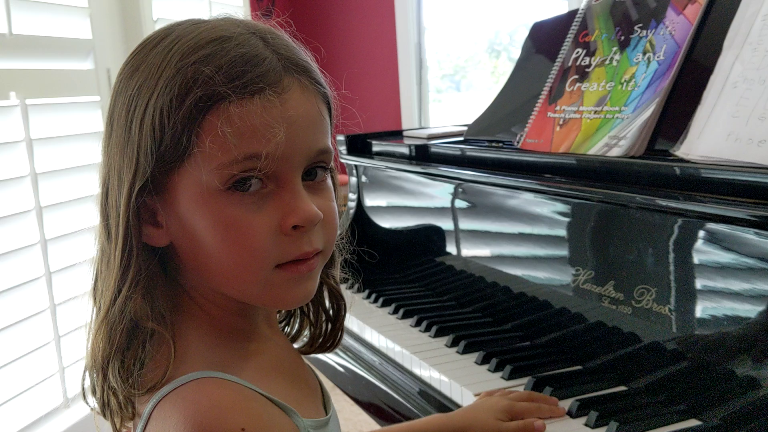
Should you let your child quit music lessons because they’re not practicing? As owner of Melody Music Studios, I’ve had countless parents cancel music lessons because they’re tired of struggling to get their child to practice. But is this a good reason to cancel their child’s music lessons?
Benefits of Music Lessons
I get it; music lessons can be time-consuming and costly. As parents, we do our best to ensure our children get the best education and expose them to many things as possible to help them succeed. At the same time, we want to see a return on our investment. When your child isn’t practicing, it can feel like your time and money are being wasted. But is it a waste just because the student struggles with practicing? Is this a good reason to cancel lessons? Are you sending the right message when you allow your child to quit?
Music lessons teach more than just how to sing or play an instrument. It teaches young students discipline and how to continue even when it’s difficult. When you let your child quit, you’re missing out on a perfect teaching moment. Would you let your child quit school because it’s challenging or they won’t do their homework? When your child grows up and has a difficult job, will they quit easily?
But what if your child is uninterested in music, or it’s not their thing? There’s still great value in taking music lessons. Instead of letting your child stop altogether, I suggest setting a time frame for continuing before they can quit. Since a beginner’s first year of lessons is the most difficult, I suggest mandating your child stay with lessons for at least a year so they go beyond what I call the “beginner’s hump.” If the student still wants to cancel after your given time frame, you’ll know it’s because of a lack of interest, not because they’re running from a challenge.
Find out the cause before throwing in the towel. Is there another instrument that may be of more interest to your child? Is there another music teacher who may offer a different approach that interests your child? If your child still wants to cancel after exhausting all avenues, at least they’ve been exposed to music that will stay with them for the rest of their lives. There are also long-lasting academic benefits to your child’s education and learning.
Reasons for Not Practicing
So why doesn’t a student want to practice in the first year of lessons? If we can figure out why they’re NOT practicing, we can reverse it to ensure they DO practice. Here are five reasons students don’t (or won’t) practice and the solutions.
#1 Problem: Student Doesn’t Understand What’s Taught or Assigned (or Lack of Assignments)
Not understanding is the biggest secret to why a student doesn’t practice and probably 85% of the root cause. Most students will rarely admit they don’t understand what’s taught or assigned, making this the most challenging problem to detect.
Solution: To ensure your child understands what they were taught, ask them to tell you what they learned in the lesson and their assignments. If your child is unable to do that, there’s the problem. It could be that your child is not listening in the lesson, which, if this is the case, you’ll probably find this to be a problem in other subjects, not just in the music lessons. Or the music instructor may not be teaching in a way or with the right curriculum to help your child understand. As a parent, be proactive and speak with the instructor, asking how they communicate the information and assignments. With my students, I ask questions after explaining a new concept to make sure they fully understand and are engaged. If they cannot answer my questions, I repeat what I taught them and then ask again or have them demonstrate it. Consider being present during a lesson to see how the instructor engages with your child, especially when first starting. Once you feel comfortable with the instructor’s teaching ability, I suggest not continually sitting in the lesson, as that may distract the student.
#2 Problem: The Perfectionist Student
The most challenging type of student is the perfectionist because they want to play it perfectly the first time and don’t like learning something new. So, if you have that type of child, it may be challenging to make them stick with it when they are constantly learning new concepts and making mistakes as they learn.
Solution: Keep reminding your child that mistakes are a part of the learning process, but as they practice, they’ll play it perfectly in no time. Music lessons are the perfect way to help your child learn to tackle new concepts, which can help in all aspects of life. There will be more on the perfectionist student in a future blog.
#3. Problem: Not Enough Time
If you’re a private music teacher, how often have you heard your students say they didn’t have time to practice? I consider this more of an excuse than the actual reason, especially when it’s repetitive. As humans, we make time for the things we want to do. So, the underlying reason is either they don’t want to do it (which could be because of the #1 reason mentioned), or the student needs help with time management.
Solution: First, find out if time is actually the problem. If it is, the student is either overbooked, meaning they will have to remove something from their schedule or learn to manage their time better. Time management is also a life lesson, which is another benefit of music lessons. Since most activities in a student’s life are scheduled, such as school, music lessons, homework, sports, and church, among other activities, why not mandate the practices also be scheduled? Since music lessons are most like homework, I tell students to link practicing with their homework, either before or after, or whatever fits best in their schedule. Practicing at the same time every day will make it a part of the student’s daily routine. The more they practice, the better they’ll get, the better they get, the more they’ll enjoy playing or singing, and the more they’ll want to practice!
#4 Problem: The Student Doesn’t Enjoy What’s Taught
If your child tells you they don’t like the songs or what they’re learning, ask them why. Keep in mind that this could be another excuse, and the real reason could be back to problem #1. However, if your child has specific reasons for not liking what they are learning, there is a solution.
Solution: If your child is complaining about the fundamentals in the lesson, like technique, scales, and exercises, remind your child that this is part of learning, and every great musician has to learn these things. If it’s a particular song or style, ask your child what songs or styles they are interested in. You can relay this to the music teacher to see if these could be incorporated into the lessons, even if only as a bonus part of the lesson. Adding their favorite songs or styles could motivate them to practice, but only if they fully understand everything. Teaching the student’s favorite song may help to practice in the short run; however, it doesn’t motivate the student in the long run if they still do not understand what’s taught.
#5 Problem: Student is Guilted into Practicing
Many react negatively when pressured or guilted into doing something, and practicing is no different. Sometimes, the worst thing a parent can do is continually pressure the student to practice.
Solution: Instead of a negative response to not practicing, give rewards when they do practice. I give points to my students for practicing and passing their assignments with a prize after so many points. You can talk to your child’s music teacher about a point system you and your teacher can work on. Nothing works better than “bribing” a young student to practice and pass assignments.
So what if you have done everything listed here, and still your child won’t practice? I believe it’s still worth the time and money invested, even if they only play or sing during the lessons. They will still learn discipline and how to stick with something. They may not progress as quickly without practicing, but when they’re adults, they may remember a lot of what they learned and may even choose to come back to music lessons. Many adults who sign up for lessons tell me they wish they had practiced more or their parents didn’t let them quit.
Don’t be the parent who lets their child quit only to have them regret it when they’re adults. So carry on, parents; your child will thank you someday!

Kathi Kerr is the owner/founder of Melody Music Studios, who hires teachers nationwide.

No responses yet